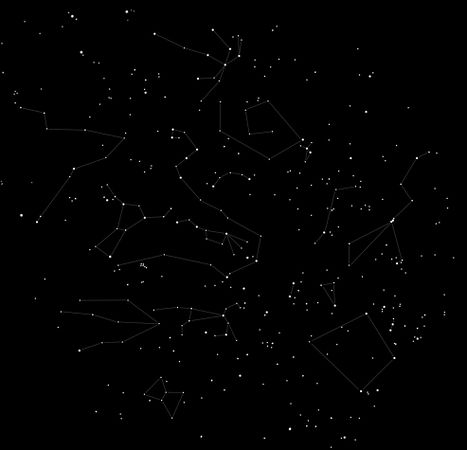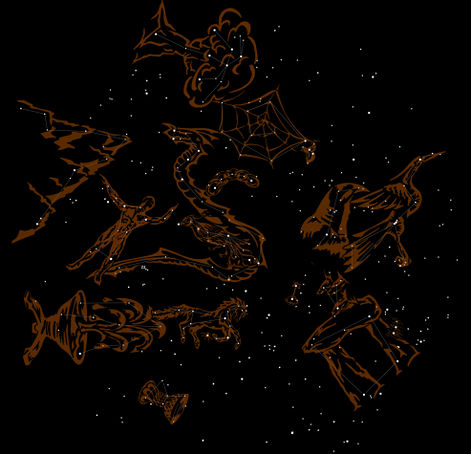Astronomancy
Overview
The constellations have been known since time immemorial – they figure, largely unchanged from their present forms, on some of the oldest buildings and artifacts in the world. Many magicians – especially those of Urizen – believe them to be a map or chart of the powers of the world reflected above – as if the sky were a great dark lake and reflected on its surface was the means to understand, control and manipulate the forces of nature.
At its core, astronomancy is a magical tradition that involves identifying patterns in the stars associated with fundamental magical and natural laws, and drawing power from them to fuel ritual magic. These patterns - the constellations - are held by many astronomancers to be the same tools the Creator used to forge Creation. Like the runes and the narrative principles of dramaturgy, Astronomancy is a means of placing magic in context and understanding it.
Invocation and Command
The stars are handles – physical ways to grab the force of magic. Nobody in the Empire imagines The Stork is an actual stork. That arrangement of stars you can see in the sky is the way it is to represent one of the primal powers of creation; by using that imagery and incorporating it into your rituals, you are tapping into that primal power and associating your ritual with it.
Astronomancers believe that the sky is limitless, and so are the powers it represents; the constellations known and codified by the Empire are merely the tip of the iceberg. Every star is part of a constellation and every constellation is a representation of a cosmic principle, a natural force or a universal power. The codified ones are simply those whose meaning and purpose is clearly understood; there exist many more to discover, comprehend and codify. Every astronomancer dreams of naming a new constellation and adding them to the great catalogue.
Using the constellations the easy way, an astronomancer can draw the design on an implement or artifact, arrange things or people to recreate the design below (such as standing your ritualists in the shape of The Fountain or The Chain) or simply invoke them during a ritual to shine favourably or unfavourably upon the outcome or a specified target. By naming propitious stars to someone you could bless or curse them.
As Above, So Below
Astronomancers firmly believe that echoing the structure of the constellations strongly influences the environment – it is not uncommon to find an Urizen spire's encampments laid out in the form of The Net, or Astronomancer’s chambers arranged specifically to evoke a particular constellation.
Tulpas
The constellations are not sentient or sapient in any meaningful way – they are symbols of potentiality, emblems of cosmic forces ill-understood by the Empire’s magicians. But sometimes during a ritual, a combination of the existence of the constellation, coupled with the efforts of the magician, will cause the manifestation of a tulpa. These are thought-forms; concepts and ideas given form by magical will and the motive power of the Constellation.
Tulpas are curious creatures – constructs of will and magic that make it easier to form a connection between the constellation and mortal magicians. The process by which a tulpa forms and manifests is structurally and magically very similar indeed to the process by which a national egregore is formed; some astronomancers view them perhaps as the understandable face of principles too vast and alien for our minds to clearly understand. As the Varushkan Egregore sometimes represents a way for magicians to understand what it means to be Varushkan, to interact with the soul of a nation in a meaningful way, so Tulpas of the Claw allow a magician to interact with the principle of conflict between living things.
They are bridges, formed by magicians to connect them to these potent principles. Essentially the magician gives the magic a physical form or a spiritual form that is easier for mortal minds to interact with. In a real sense, if the magician were not doing the ritual the tulpa would not exist - it is like a combination of the cosmic principle and the ritual itself. It exists from moment to moment at the point where magicians work magic using it. Through the principles of astronomancy, the tulpa allows magicians to connect to the power of the constellations; they are not entities in the way the eternals are entities; the Urizen in particular describe them as being much more like cosmic ushabti.
Whilst tulpas traditionally form their own bodies, astronomancers who are deeply aligned with a constellation during a working sometimes experience what they describe as “brushing by” or "alignment" with a tulpa. The ritualist’s mind brushes the consciousness of a tulpa during a ritual and the ritualist finds themselves behaving in a way which personifies or exemplifies the principle of the Constellation. The ritualist does not lose control or consciousness, they remains in control of their own actions; but all factors to do with the constellation are amplified.
Stars and Virtues
Unlike the Runes, there is no direct correlation between the constellations and the virtues of the Way. A sect, especially an Urizen sect, may adopt one or more constellations that are relevant to their approach to the Way. A Vigilant priest whose calling is to secretly watch for corruption within the Empire might embroider garments with the Spider, while an individual working to confront the external enemies of the Empire might employ the Claw or the Drowned Man. The Mountain is sometimes seen as a metaphor for Ambition, while either the Chain or the Three Sisters might be used by sects dedicated to a particular vision of Loyalty that is in tune with the nuances of the two very different constellations. Some Urizen priests dedicated to Pride use the Phoenix - often used as an iconic symbol of the nation as a whole - as a symbol for their understanding of that virtue.
Constellations
There are eighteen constellations recognised by Imperial astronomancers, from which they can draw power.
| Constellation | The Law | Common magic |
|---|---|---|
| The Chain | Things hold together | Bonds, oaths |
| The Chalice | Things heal; things apart come together | healing, mending, connections |
| The Claw | Things bleed | Battle, destruction, violence |
| The Door | Things move and change | transport, travel, personal transformation |
| The Drowned Man | Things end | Curses, misfortune, ending |
| The Fountain | Things live | Growth, fertility, foundations |
| The Great Wyrm | Things change and transform | magic, grand transformation |
| The Key | Things are revealed | scrying, opening, skills |
| The Lock | Things can be hidden | wards, defence, concealment |
| The Mountain | Things are not easy | obstacles, effort, trials |
| The Oak | Things endure | strength, endurance, fortitude |
| The Phoenix | Things learn | knowledge |
| The Spider | Things are watched by a hidden eye | hidden forces, eternals, sovereigns |
| The Stallion | Things procreate | fertility, growth, wealth |
| The Stork | Things matter | decisions, responsibility, leadership |
| The Web | Things are connected | relationships, synchronicity, sympathy |
| The Three Sisters | Things are connected by blood | consequences, ties of blood, sorrow |
| The Wanderer | Things are not what you think or Things go awry | destiny, fate, chance |
In each case, the common magic mentioned is just a starting point or summary. The individual pages for each constellation contain a lot more information about the use of a constellation in ritual magic or spellcasting.


